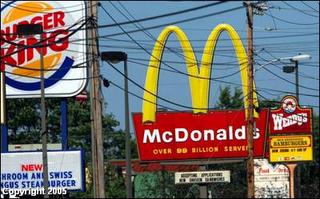 By Clarke Canfield
By Clarke CanfieldThe Associated Press
OGUNQUIT, Maine - You won't find McDonald's golden arches or pink-and-orange Dunkin' Donuts signs in this seaside town. It'll stay that way if voters approve a proposed ordinance that would outlaw chain restaurants.
Ogunquit is the latest town nationwide to consider a law over so-called "formula" businesses. From Maine to California, more than 12 municipalities have laws that ban or restrict chain restaurants, motels and other retailers.
Ban supporters say they don't want their town to turn into another congested strip of eateries.
"This is a pristine and special community that we are stewards of," said Mary Breen, the owner of a high-end bakery who spearheaded a petition drive to get the question on the Nov. 8 ballot. "It's not about finance and marketing, it's about preserving this small fishing and arts community."
Opponents say Ogunquit's existing ban on drive-throughs and its design review process are enough to maintain the town's character.
Market forces should determine which restaurants locate in town, said Brian Aromando, who owns Art and Soul art gallery.
"I think an anti-formula ordinance goes too far and isn't necessary to address the problem," said Aromando, who is on the town planning board.
As chain stores have spread, so has the movement to control them on the local level, said Stacy Mitchell, a senior researcher with the nonprofit Institute for Local Self-Reliance.
Communities are given a lot of leeway over zoning and land-use issues, and there have been few challenges of the laws. In Coronado, Calif., land owners sued over a formula retail ordinance but lost in a state court, Mitchell said.
The issue is about more than just signs or drive-throughs -- it's about economics, Mitchell said. Studies show that more money stays within a community when it is spent at locally owned businesses, she said.
A 2003 study in Maine showed that 45 cents of every dollar spent at local businesses in three midcoast towns stayed in the communities and another 9 cents stayed in Maine. The study found that 15 cents of every dollar spent at national chains stayed in the state, she said.
While Mitchell supports the free market concept, she also thinks communities have a responsibility to plan.
"This isn't a free-for-all, because there are costs and benefits borne by the community as a whole," she said.
Breen, who started the Bread and Roses Bakery in 1989, became alarmed when rumors spread that a Dunkin' Donuts was coming.
Dick Grotton, president and chief executive officer of the Maine Restaurant Association, said if people don't want chain restaurants in town, they won't support them.
I'm not so sure I agree with this ordinance...just because some mom and pop bakery is afraid of a little competition? Basically, they are kicking all the other kids out of the sandbox because they are afraid if they don't, their sandcastle won't be the biggest. Provide a product with good enough quality and value that people won't be driven to patronize the Dunkin' Donuts down the street! Geez, just because you want all the business to yourself doesn't mean you should force everyone into the monotony of eating only at your bakery every single day. Choices people! Embrace them!
ReplyDeleteOn a similar note, I do agree with restricting signage of these franchise establishments in order to avoid the tacky "fast-food strip" look. I lived in a suburb of Cleveland for awhile which restricted signs from exceeding the height of the building. It made a huge difference as far as lending a classier, clutter-free, minimalist look to the city. I was surprised at what a contrast it was when driving into the next city over littered with 50 foot tall White Castle signs and Golden Arches as far as the eye can see. Less is more sometimes, and classing up the signage a bit could also lend a perceived feeling of "class not trash" when frequenting a fast food establishment.
~Carrie =)
I think the anti-chain ordinance is bullshit. A similar idea was being considered in San Francisco last year. It's proven that this type of regulation doesn't help mom and pop establishments in the long run. It actually hurts them, because the chain store traffic and the economic benefits of it go to the next town over with the chains.
ReplyDeleteAround here, Charlottesville and Blacksburg, Va. and Chapel Hill and Cary, N.C. have vigorous sign ordinances. The effect is kind of like it was in your former suburb, muted but extremely tasteful. In the case of Charlottesville and Chapel Hill, the signage becomes a lot more creative and distinctive because designers have to work inside a different set of parameters.